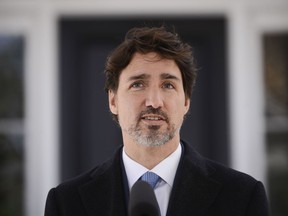Balkan Devlen on COVID-19: What Canada should not do to combat the coronavirus
When dealing with deep uncertainty, it is easier and perhaps more important to know what not to do

Article content
Over recent weeks, there has been a deluge of commentary on what governments should do to deal with the COVID-19 pandemic. The recipe for success seems to coalesce around what democracies like Taiwan and South Korea have done: early and widespread testing, careful contact tracing, effective isolation of those infected, social distancing for the rest, lockdowns when necessary and transparent and accurate communication from policymakers.
There are also a lot of opinions on what a post-COVID-19 world will look like, but the reality is that it is still too early to say what the political and social consequences of this pandemic will be. However, as Nassim Nicholas Taleb — the scholar and risk analyst who wrote the book “The Black Swan,” which discusses the impact of rare and unpredictable events — pointed out, when dealing with deep uncertainty, it is easier and perhaps more important to know what not to do. In that spirit, I want to offer the following five suggestions of what Canadian policymakers should not do in the coming days.
First, don’t listen to the siren song of “return to normalcy.” Canada should resist the temptation to relax precautions quickly at the first sign of improvement. There will be immense pressure from society and businesses to go back to the way things were, as the social, psychological and economic costs of social distancing and the economic shutdown mount. Giving in to those pressures would be a serious mistake since the trade-off they purport to suggest — economic versus human costs — is a fake one. The choice is between economic pain now while minimizing lives lost, versus much bigger economic costs later with a staggering loss of human lives.

There will be a time to return to economic normalcy, and of course, the sooner it can be managed, the better. It is true that, at a certain point, these temporary measures will be more harmful than helpful, and so policymakers should be actively planning for how to ease off on these measures. But to try to rush that process before the underlying health crisis is under control, or to move too quickly without a forward-thinking and flexible plan, would be utterly disastrous.
Secondly, do not undermine the public’s trust. Don’t use this crisis as an opportunity to expand state power and control over society. Don’t try to score political points. This is not the time for political ploys and power grabs. Maintaining social cohesion is of paramount importance in the face of uncertainty and mounting fear among the public, and trust in policymakers is key to it. Do not undermine that trust.
Moreover, don’t lie to Canadians. The fastest way to undermine public trust is by telling lies, even if they are thought of as white lies. When the government needs to reverse its recommendations constantly (such as on border restrictions and wearing masks), it could give rise to scenarios in which the public may simply ignore the advice the government has to offer. Public trust is necessary to manage this crisis and it is far more important than political expediency.

Third, don’t expect international institutions to work. Canada should not assume that existing global governance mechanisms centred around United Nations agencies such as the World Health Organization are capable of dealing with this and similar crises in the future. This is still the world of nation-states and the management of this crisis will ultimately fall on them. Moreover, the WHO and other bodies are only as good as the information they are able to receive from their member states.
With that in mind, it is important that we don’t trust authoritarian regimes and their supposed successes. Canada should not overlook the responsibility of the Chinese Communist party for turning a local health crisis into a global pandemic. Do not accept the Chinese government’s numbers about this pandemic at face value.
Authoritarian regimes lie, suppress, obscure, evade and dissimulate. Don’t take their word for it. Our distrust, skepticism and vigilance should also extend to countries like Iran and Russia, which are similarly motivated to fudge their numbers, squash the truth and pollute our information environments.

And finally, don’t over optimize. There is still a lot we do not know about this virus. The models we use have large margins of error and the predictions they produce come with a great degree of uncertainty.
Under these circumstances, do not choose policies that are precisely tailored to the models, since they will be very sensitive to the initial assumptions. Robust policies that minimize the possibility of worst outcomes across multiple models should be preferred. And, if a policy or program isn’t working, governments should be flexible enough to reverse course.
While these suggestions are designed with the COVID-19 crisis in mind, they are perhaps useful touchstones upon which governments should think about emergency policymaking in general. Had some of these approaches been kept in mind before this crisis, we may very well have been in a more advantageous position today.
National Post
Twitter.com/BalkanDevlen
Balkan Devlen is a senior fellow at the Macdonald-Laurier Institute and an associate professor at the University of Copenhagen. He is also a superforecaster with Good Judgment Inc., a geopolitical forecasting company in the U.S.














Postmedia is committed to maintaining a lively but civil forum for discussion. Please keep comments relevant and respectful. Comments may take up to an hour to appear on the site. You will receive an email if there is a reply to your comment, an update to a thread you follow or if a user you follow comments. Visit our Community Guidelines for more information.